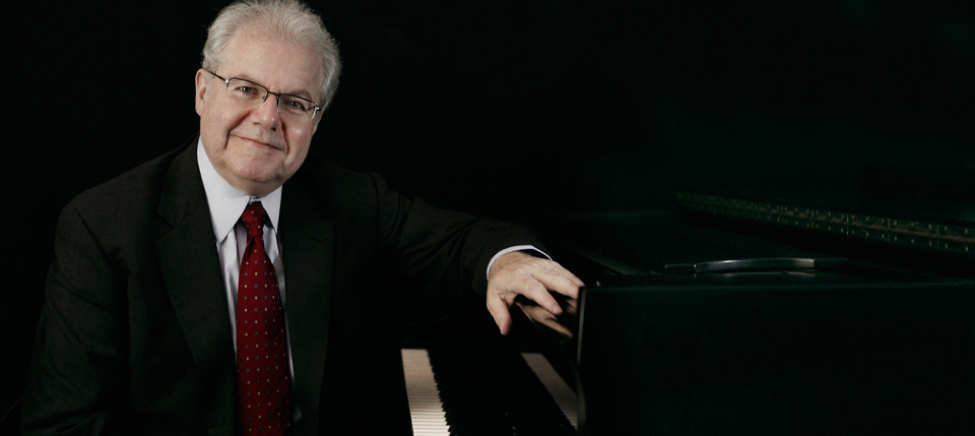Emanuel Ax: The Evolution of the Piano

Courtesy of Lisa Marie Mazzucco
Listen
WHRB Classical Producer Allison Pao spoke with brilliant pianist Emanuel Ax on April 29th to talk about his upcoming lecture at Harvard, his upcoming concerts with the Boston Symphony Orchestra, and his thoughts on Brahms, Beethoven, and the evolution of the piano. Read on for some interesting insights or listen to the entire interview above!
Pao: You’re giving a lecture “On Brahms and Beethoven****” at Harvard tomorrow. Can you tell us about the influence of these composers on you as a musician?
Ax: I think, quite honestly, it would be impossible to be a piano player and not be involved with Brahms and Beethoven. They are two of the three B’s, the third being Bach. I think it’s sort of like, well, the Holy Trinity, for musicians!
Pao: In addition to the traditional piano repertoire, you’ve also premiered many works for piano by living composers including John Adams, Christopher Rouse, and Bright Sheng. Is there anything specific you enjoy about performing new pieces, and how does that experience differ from performing such monumental works as the 2nd Piano Concerto by Brahms [which you’re playing with the BSO this weekend]?
Ax: One difference is that you get to actually talk to the composer, which is very exciting, especially if you like the piece a lot, it’s wonderful to be able to talk to the person who created it…Imagine, if you’re an actor and you could talk to William Shakespeare, it would probably be very nice! For me, talking to Mozart or Brahms or Beethoven would be amazing. I think you learn that composers are usually very open and very permissive to performers, so it gives you a little more courage in approaching works by people who are no longer around. You know, taking, once in a while, a liberty that you might not otherwise.
Pao: What’s your opinion on historically informed performances, then?
Ax: It’s very exciting to get more information on what people did – literally did – not just what’s on the page, but how it must have sounded. How the instrument sounded, how people approached things – how valuable was the printed page to the performer in 1805? How much liberty did they take? What did the piano sound like in those days?…I wouldn’t want to give up my nine-foot Steinway, but I love the idea that I can try playing on an 1826 Graf [piano maker], and maybe carry some of that into how I play on the Steinway.
Pao: Can you speak a bit more about how the 1826 Graf piano would differ from the modern Steinway piano?
Ax: First of all, it’s sheer volume. We have large concert halls now, and if you played in Symphony Hall on an 1826 piano, which would have been towards the end of Beethoven’s life, you’d have to strain your ears a lot. And you certainly couldn’t play with the Boston Symphony the way they normally play, because you wouldn’t hear a note of the piano. The sheer volume of the orchestra would drown everything out. So that’s the first adjustment, you have to have a different scale for volume. Second, the old pianos are probably a little more clear and a little less sustaining…the piano has become much bigger, much heavier, steel strings as opposed to different material, hammers that no longer leather-covered but felt-covered, big pedals, a steel frame that makes the tension of the strings much, much greater, all of that adds to volume and adds to variety of sound. And in some cases, to uniformity of sound. In some cases, I think the modern piano in some ways is more uniform than the older instrument. But it’s a wonderful comparison.
Pao: I’m not sure if you’ll have an answer to this question, but do you think that the piano as an instrument is finished evolving, or do you think that in the future, there could still be more changes to your instrument?
Ax: Well, I just played on a piano that’s being made in Brussels – or rather, in Bruges – by a man named Chris Maene. And it’s a piano that instead of having cross stringing – all the modern pianos now have strings that go one way and then other strings above them that go diagonally across, so two levels – well he’s made a piano that’s straight strung. So no crossing, but big: it’s like nine feet, six inches. It’s a huge instrument but at the same time it’s strung the way the old ones used to be strung, so you’re creating a different sound again. So I think we’re not quite done, I’m not sure. And it depends what different composers will write for…maybe there will be a composer who imagines pianos working differently and we’ll have to adjust the piano to that. Beethoven did that to some degree. He was always looking for pianos with more sound and a bigger range – lower bass notes and higher treble notes. That changed the instrument itself! So, we may not be done.
You can hear Emanuel Ax speak on April 30th at 6pm in the Knafel Center (10 Garden Street) in a panel discussion “On Brahms and Beethoven.” You can reserve your free tickets here or in-person at Farkas Hall. You can also hear Emanuel Ax play the Piano Concerto No. 2 by Brahms with the Boston Symphony Orchestra in Symphony Hall at 8pm on May 1, May 3, and May 5. You can purchase tickets here.
Allison Pao is a radio host for WHRB Classical. You can hear her upcoming orgy on Florence Price on May 7th from 3pm to 8pm. This interview was produced by studio engineer Emily Spector.